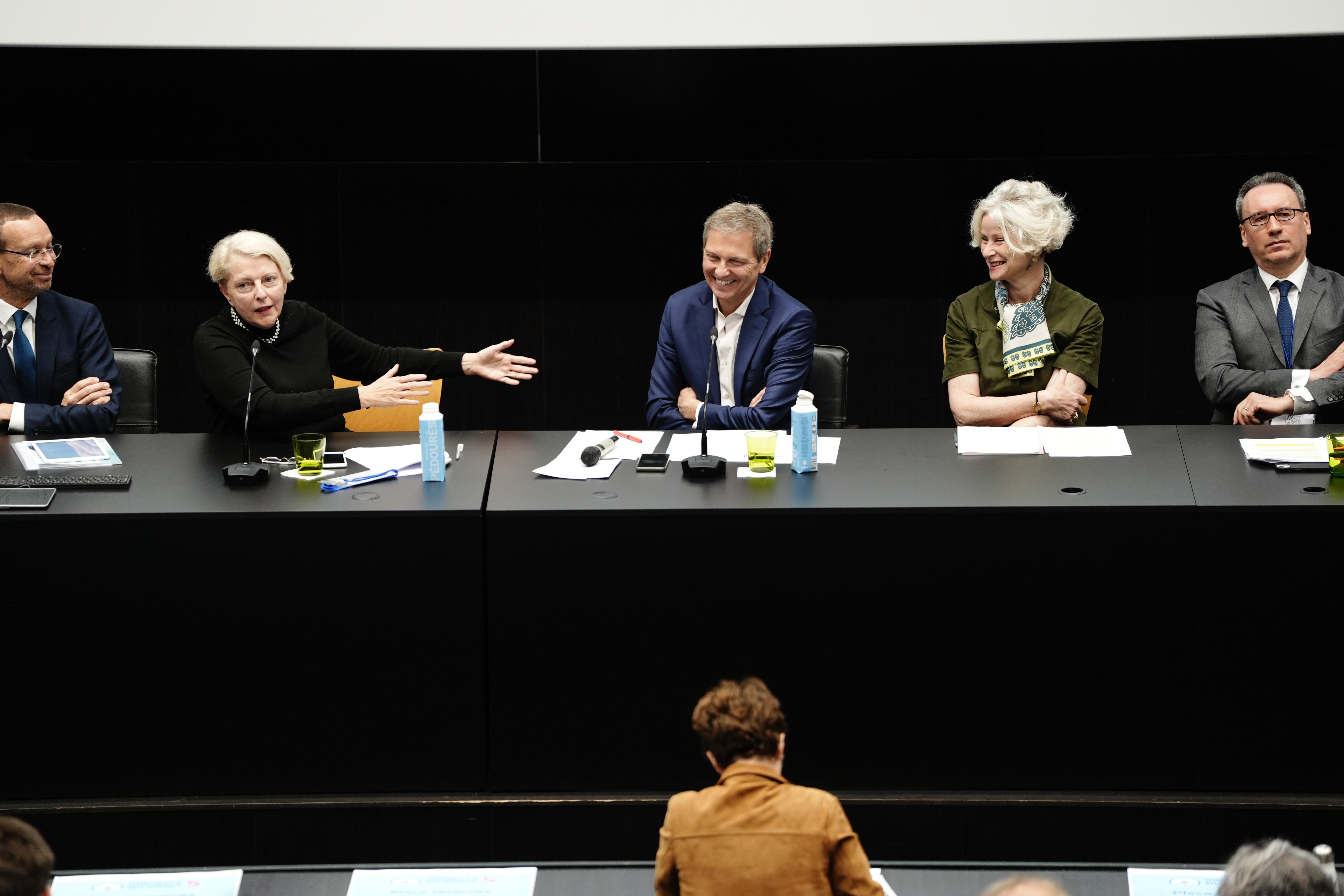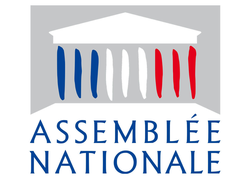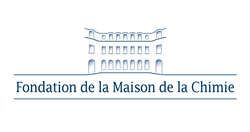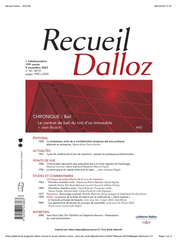March 11, 2025
Conferences

🌐follow Marie-Anne Frison-Roche sur LinkedIn
🌐subscribe to the Newsletter MAFR Regulation, Compliance, Law
🌐subscribe to the Video Newslette MAFR Surplomb
____
► Full Reference : M.-A. Frison-Roche, "Le juriste, requis et bien placé pour le futur" (The lawyer needed and well placed for the future), in Groupe Lamy Liaisons, Les Éclaireurs du Droit, Hôtel de l’Industrie, Place Saint Germain des Près, Paris, 11 March 2025, 16h.
____
This speech opens a series of 4 workshops on the following themes:
- The challenge of Trust
- The challenge of Risk
- The challenge of Transmission
- The challenge of leadership
____
🧮see the full programme of this manifestation (in French)
____
⬜see the slides basis made for this speech (which were not projected) (in French)
____
🎥 watch the short video made after the conference (in French)
____
► English Summary of this introductory conference: The 4 sessions will address the successive themes of trust, risk, transmission and leadership, which legal professionals are facing, particularly as a result of algorithms.
For an introductory analysis, it is possible to make a distinction inside the Future.
The future has a part of Stability: the jurist can contribute to this stability, i.e. the preservation of the past (I).
The future has an part of Predictability: the lawyer must increase this part in the present itself (II).
The future has a part of radical novelty (III): at this point, which may correspond to a precipice, if no one had imagined it, the lawyer can also be there. Until now, we think of lawyers more in the first 2 hypotheses, less in this one. Is it pertinent?
In each of these dimensions, the algorithmic system (AI) is presented as replacing or dominating the human.
In each of these 3 dimensions, Lawyers must be present, as they form a community that must remain united around the very idea of Law (algorithms do not conceive ideas, it is humans who transmit them to other humans, and the algorithmic system must remain a medium).
As far as the Stability of the future is concerned, the Lawyer can and must contribute to it, in particular through Transmission, because there is less of a blank page as algorithmic 'creation' is based on past data, and training, where the human being will be all the more central as machines have to be handled.
As far as the Predictability of the future is concerned, it is a question of assessing the Risks, whether specific or systemic, legal or non-legal, in order not to take them or on the contrary to take them. The more the Lawyer is involved in risk-taking, the more he or she will be in the right place, before and during the action.
As far as the Radically New future is concerned, it is not easy to qualify AI as such or not, but now the possible disappearance of the Rule of Law in the United States is one of them. All Lawyer are expected. Every lawyer must have two virtues (which the algorithm cannot not have): the virtue of Justice and the virtue of Courage. It is these virtues that we must pass on and share.
____
Current events have led me to devote the time available to me to focusing on a single perspective, the third, to say what is expected of Lawyers if we perceive something radically new in the near future, what everyone does.
Indeed, in the United States, on the one hand there is a head of state for whom the Law does not exist and who uses the power of regulation to express his absolute indifference to other states, companies and human beings, and on the other an entrepreneur who claims that he is going to become the master of algorithmic technology, a system over which he already wields great power.
Faced with this Radical Novelty, we expect the community of Lawyers, all lawyers, whatever their place, their technical mastery, their level, their nationality, to speak out and say No. As Kelsen, Cassin or Ginsberg did. Say No and help others to say No. To do this, Lawyers, as human beings who care about other human beings, must be aware of the twofold virtue expected of them: the virtue of commitment to Justice and the virtue of Courage.
________
June 12, 2024
Conferences

🌐follow Marie-Anne Frison-Roche on LinkedIn
🌐subscribe to the Newsletter MAFR Regulation, Compliance, Law
____
► Full Reference: M.-A. Frison-Roche, Participation in the panel "Une Gouvernance responsable : vers un mieux vivre ensemble ?" ("Responsible governance: towards a better way of living together"), in Grenelle du Droit 5. L'avenir de la filière juridique, Association française des juristes d'entreprise ("The future of the legal profession"), AFJE), Cercle Montesquieu and Paris Panthéon-Sorbonne University, Campus Port-Royal Université Paris 1 Panthéon-Sorbonne, 1 rue de la Glacière, 75013 Paris, June 12, 2024
____
🧮See the full programme of this event (in French)
____
🎥watch the interview made just after this round-table discussion (in French)
____
🪑🪑🪑🪑🪑 will also be taking part in this round-table discussion:
🕴️Yves Garagnon, Chairman of Dilitrust,
🕴️Pierrick Le Goff, lawyer, partner at De Gaulle Fleurance,
🕴️Sabine Lochmann, Chairman of Ascend,
🕴️Vincent Vigneau, President of the Commercial, Economic and Financial Chamber of the Cour de cassation (French Judicial Supreme Court)

____
► English presentation of my intervention in this event's opening plenary round-table: In this plenary round table which opens the event, devoted to the theme of 'responsible corporate governance', for my interventions based on my work I will have the opportunity to address more particularly these different perspectives:
- How the new Compliance Law, which gives concrete expression to the responsibility of enterprises in a new relationship with States and with civil society, constitutes a 'legal revolution
- 💡for the record, mafr,📝Compliance Law, 2016 ; (ed.) 📘Compliance Monumental Goals, 2022
- how the judgment handed down by the Tribunal judiciaire de Paris (Paris First Instance Civil Court) on 28 February 2023 (Total Ouganda case) is remarkable and already constitutes a turning point in case law
- 💡for the record, mafr, 🎤audition as amica curiae, hearing of 26 October 2022 before the first instance Paris Court; (ed)📘Compliance Jurisdictionalisation, 2024
- how the relationship between States and enterprises is being renewed by this profound legal movement expressed by Compliance Law
- 💡for the record, mafr et M. Boissavy (ed.), 📕Compliance et droits de la défense - Enquêtes internes, CJIP, CRPC, mafr (dir.), 📘 Compliance Obligation, 2025
- how internal lawyers have a decisive and central role to play in this movement, particularly in the mechanism of vigilance / corporate sustainability due diligence, the "cutting edge" of Compliance Law,
- 💡for the record, mafr, 📝Contract of Compliance, Compliance stipulations, 2023 ; (ed.), 📘Compliance and Contract, 2025
- what is meant by the "Ex Ante responsibility" of enterprises, which does not necessarily entail their Ex Post liability, a distinction which lawyers are the guardians of
- 💡for the record, mafr, 📝La responsabilité Ex Ante, pilier du Droit de la Compliance ("Ex-Ante Responsability, Compliance Law Pillar"), 2021
- how European Compliance Law is profoundly humanist, an identity that distinguishes European Compliance from American Compliance and, above all, from Chinese Compliance.
- 💡for the record, mafr (ed.), 📕Pour une Europe de la Compliance ("For the Europe of the Compliance"), 2017
________
read the article about this round table written by Delphine Bauer in Actu-Juridique (in French)
April 8, 2024
Hearings by a Committee or Public organisation

🌐 follow Marie-Anne Frison-Roche on LinkedIn
🌐subscribe to the Newsletter MAFR Regulation, Compliance, Law
🌐subscribe to the Video Newsletter MAFR Surplomb
____
► Full reference: M.-A. Frison-Roche, Audition by the French National Assembly's Law Commission on the confidentiality of legal advice (the "Legal Privilege à la française"), 8 April 2024.
____
I had expressed my opinion on the need for French legal system to better ensure the confidentiality of legal opinions drawn up by internal lawyers in companies, in an article published in 2023 in the French academic journal Recueil Dalloz: "La compliance, socle de la confidentialité nécessaire des avis juridiques élaborés en entreprise (Compliance Law, the cornerstone of the necessary confidentiality of legal opinions drawn up by companies". Compliance, the cornerstone of the necessary confidentiality of legal opinions drawn up by companies).
Following on from this article, and as a specialist in Regulatory and Compliance Law, I was invited by the French National Assembly's Law Commission to give my opinion on the proposed law n°2022 on the confidentiality of consultations by in-house lawyers ( Proposition de loi n°2022 relative à la confidentialité des consultations des juristes d'entreprises), often named in French Legal privilege à la française.
____
► Summary of this presentation: I have shown that we must start not from the person (external lawyer / in-house lawyer, for instance) and not even centrally from the information in question (branch of Law by branch of Law), but from the Goals pursued, i.e. from Compliance Law.
In this respect, we must not be misled. We could do so by confusing mechanical "conformity" with this new branch of Law: Compliance Law. Conformity is merely a tool of Compliance Law. Out of concern for the correct use of the French language, as "Compliance" appears to many to be an American term, the proposed law uses the term "conformité" but refers to Compliance Law. Conformity" is merely the mechanical obligation to obey the applicable rules, which is the fate of any subject of law, subject to the mandatory rules, a passive position common to everyone in a State governed by the Rule of Law.
Compliance Law is quite different, with conformity being just one of its tools. On the one hand, Compliance Law imposes an active obligation, and on the other, it targets only certain legal subjects: companies. For them, it is a matter of ensuring that certain goals set by the legislator are actually achieved, which becomes effectively and efficiently possible thanks to the power of companies (financial power, organizational power, management power, information power, location power, information power). These "Monumental Goals" are either negative (preventing systems from collapsing) or positive (ensuring that systems improve).
For companies to play this role - a role that is not required of other "ordinary" people, as they are not "in a position" to take on such a burden, particularly in terms of finance and organization - those in charge of organizing themselves and taking action, i.e. companies, must "detect and prevent" system failures (as required by laws such as US FCPA, French so-called Sapin 2 and Vigilance laws, European CSRD and CS3D, etc.). To "detect and prevent", which is an order from the Legislator, companies need to know the weaknesses of their organization and of the people they answer to, in order to remedy them: "remediation" is a "remedy" to ensure the "sustainability" of "systems".
This set of key concepts lies at the heart of Compliance Law, the branch of law That focuses on the future.
It is the legal opinions, for example, and in particular the report resulting from internal investigations, that enable those who decide and control this organization (the managers) to fulfill the role entrusted to them by the State. If these opinions are not confidential, the result is not the remediation and preservation of global systems (competitive, climatic, digital, energy, banking, financial systems, etc.): the effective managerial solution in Ex-Ante then consists not in seeking information but, conversely, in not seeking this information, since obtaining it will lead to the weakening of the company through the sanction that the information produces, for lack of confidentiality.
The interests of the system, the State and the company are disjointed, because Compliance Law implies their alliance, which is what the confidentiality of legal opinions produces.
This is why Compliance Law must, by its very nature, ensure the confidentiality of legal advice.
____
When asked about the actual text of the proposal, I felt that the explanatory memorandum was particularly relevant, since the link between Compliance Law (admittedly called "conformité" in the proposed bill by a rather too mechanical respect for the French legal language, from which the French legislator has so far been unable to dispense....) is clear, that this confidentiality is attached to the document, that the company can waive it, and that it is clearly distinct from professional secrecy, all three of which should be approved.
For my part, I've suggested a change to the procedure, which must be open to the confidentiality process.
Indeed, public authorities, such as Competition and Regulatory Authorities, are rather hostile to this confidentiality.
Having contributed a great deal to the development of Regulatory Law, and continuing to do so, I believe that Competition and Regulatory Authorities have a logic that needs to be understood. It is as follows: Regulatory Authorities are Ex-Ante (this was less true for the Competition Authorities, but it too is increasingly so) and are in a situation of information asymmetry. Their first concern is to combat this asymmetry. If we translate this into legal terms, it means that in order to carry out their mission of general interest, they must seek out all available information. However, legal opinions, and in particular the internal investigation report, are what I have described as "evidence treasure". In their logic, the Competition and Regulatory Authorities want to seize it.
There is therefore a conflict between two general interest logics: the general interest of the Monumental Goals of Compliance Law actively served by companies, at the behest of the Legislation, which requires the confidentiality of legal opinions, and the general interest of the action of Regulators who fight against information asymmetry and seek to seize the evidential treasures of legal opinions.
For the reasons given above, I believe that the Monumental Goals of Compliance must prevail. All the more so as the rights of the defence converge to this end.
Ultimately, however, it is up to the Judge, in the event of open conflict, to balance these two claims, which are based on the service of the general interest.
However, reading the proposition, it seems to me that the rather complicated procedure entrusts this to a multiplicity of judges... But since it is indeed Compliance Law which is the best basis for "legal privilege à la française", Compliance Law, which is the extension of Regulatory Law and whose advanced point is the Vigilance duty, it would be more appropriate and logical to entrust this litigation to the exclusive jurisdiction of the Paris Judicial Court. This court has already the exclusive competence for litigation about Vigilance.
This would have another fortunate effect: on appeal, the dispute would be brought before the Paris Court of Appeal, which has exclusive jurisdiction (barring exceptions) over disputes concerning decisions on French Competition and Regulatory Authorities. The judges of the "Pôle 5" (12 chambers specializing in economic law) of the very specific court are seasoned and would be well-suited to strike the necessary balance between the two general interests involved.
I think a procedural amendment to the proposed text along these lines would be welcome.
____
► See in my work those that may be of interest with regard to this hearing (all with English summary, many with bilingual working paper) ⤵️
🕴️M.-A. Frison-Roche, 📝Le rôle du juge dans le déploiement du Droit de la Régulation par le Droit de la Compliance, in 📗Conseil d'État et Cour de cassation, De la Régulation à la Compliance : quel rôle pour le Juge ?, 2024.
🕴️M.-A. Frison-Roche, 📝Compliance et conformité : les distinguer pour mieux les articuler, 2024.
🕴️M.-A. Frison-Roche (dir.),📕L'obligation de compliance, 2024.
🕴️M.-A. Frison-Roche et M. Boissavy (dir.), 📕Compliance et droits de la défense, 2024.
🕴️M.-A. Frison-Roche (dir.), 📕Compliance et droits de la défense, Les Buts Monumentaux de la compliance, 2022.
🕴️M.-A. Frison-Roche, 📝Contrat de compliance, clauses de compliance, 2022.
🕴️M.-A. Frison-Roche, 📝Le Droit de la compliance, 2016.
________
March 7, 2024
Conferences

🌐follow Marie-Anne Frison-Roche on LinkedIn
🌐subscribe to the Newsletter MAFR Regulation, Compliance, Law
____
► Full Reference: M.-A. Frison-Roche, "L’enjeu de la confidentialité des avis juridiques internes au regard des « Buts Monumentaux » de la Compliance" ("The issue of confidentiality of in-house legal opinions with regard to the "Monumental Goals" of Compliance"), in L’instauration d’un Legal Privilege à la française. Le temps de l’action au service de la souveraineté et de la compétitivité de nos entreprises, Association française des juristes d'entreprise (AFJE), Association nationale des juristes de banque (ANJB) et Cercle Montesquieu, March 7, 2024, Maison de la Chimie, 28 rue Saint Dominique Paris
____
📝On the same topic, read the article of Marie-Anne Frison-Roche "La compliance, socle de la confidentialité nécessaire des avis juridiques élaborés en entreprise" ("Compliance, the cornerstone of the confidentiality required for in-house legal opinions")
________
Nov. 16, 2023
Thesaurus : 01. Conseil constitutionnel
► Full Reference: Conseil constitutionnel (French Constitutional Council), November 16 2023, No. 2023-855 DC, Loi d’orientation et de programmation du ministère de la justice 2023‑2027.
____
🏛️read the decision (in French)
________
Nov. 9, 2023
Publications

🌐follow Marie-Anne Frison-Roche on LinkedIn
🌐subscribe to the Newsletter MAFR Regulation, Compliance, Law
____
► Full Reference: M.-A. Frison-Roche, "La compliance, socle de la confidentialité nécessaire des avis juridiques élaborés en entreprise" ("Compliance, the cornerstone of the confidentiality required for in-house legal opinions"), D. 2023, p.
____
📝read the article (in French)
____
► English Summary of the article: The French Law about the Ministry of Justice's 2023-2027 Orientation and Programming ("loi d'orientation et de programmation du ministère de la justice 2023-2027") had introduced into the French legal system the confidentiality of in-house lawyers' opinions (before the French Constitutional Council, on a question of parliamentary procedure, annulled this disposition, thus leaving the question still open).
This development is necessary in order to respond to the injunction for companies to comply more and more with the regulations, which is itself only one of the tools of a wider movement: Compliance Law.
This branch of the law, notably through the French so-called Sapin 2 Act of 2016, the French Vigilance Act of 2017 and the European Digital Services Act (DSA), requires companies to implement the necessary means to satisfy the Monumental Goals contained in the laws or regulations. This presupposes, firstly, that companies have information (via alerts, risk mapping, vigilance, sustainability reports, etc.), enabling them to identify their conformity and non-conformity, so that they can, secondly, take effective action to put an end to current breaches, prevent future breaches and achieve the goals set by the Legislator.
This Compliance System requires that the information made available to managers is reliable and honest. However, if non-conformity is not analysed and communicated in a way that is protected by confidentiality, the company will prefer not to know about it and will therefore be unable to take appropriate action, which will deprive the social community of its power to act in the future. This is why the confidentiality of in-house lawyers' opinions is based on the very definition of Compliance Law itself.
________
Dec. 9, 2014
Conferences

Lire l'article qui rendit compte de la manifestation.
Voir des extraits de la manifestation.
Il fût un temps où les "codes d'éthique" n'existaient pas et l'on s'en portait aussi bien. Quand ils sont apparus, moqueries et critiques les accueillirent. Moqueries car ils n'étaient que redondance. En effet et par exemple, affirmer l'engagement de respecter le droit n'aurait aucun sens car respecter le droit est une obligation préexistante à toute déclaration de soumission. Critiques car ils apparurent comme un mode d'internalisation du pouvoir normatif, c'est-à-dire un mode de capture du pouvoir législatif. L'entreprise devenue Portalis ...
Peut-être. Mais aussi les temps ont-ils changé, qui font pâlir ces remarques acerbes. En effet, la soumission à la loi n'est pas un acquis. La normativité peut se partager si l'exercice qu'en fait l'entreprise aboutit à ne pas contredire l'autonomie du Politique, voire la complète, peut-être la renforce.
Ici, le corps de prescription de comportements sanctionnés, c'est-à-dire la régulation, n'est pas interne à une entreprise, ou à un secteur, mais à une "profession" commune à toutes les entreprises. Il est probable que la notion d'"entreprise" soit amenée à se développer, sorte renouvelée de corps intermédiaire, dans le grand désert de la mondialisation.
L'enjeu dès lors est pour les "juristes d'entreprise" d'être véritablement une "profession". Cela n'est pas si clair lorsque la profession est "réglementée", mais enfin lorsque le Politique la nomme ainsi, cela la constitue. Lorsqu'elle se désigne ainsi, alors l'autorégulation résulterait en outre de l'autodésignation ...
Pour être une profession, il faut avoir une unicité commune à l'intérieur du groupe, et une hétéronomie par rapport à l'extérieur. La difficulté tient surtout dans cette seconde exigence, dans la mesure où cet extérieur peut être pour le "juriste d'entreprise" l'entreprise elle-même. C'est alors que l'ordre se renverse car c'est le Code d'éthique qui peut permettre aux juristes d'entreprise de prendre distance par rapport à la hiérarchie de l'entreprise et d'exister ainsi comme profession. Cela renvoie aussi à une nouvelle conception de l'entreprise, moins hiérarchisée. En cela, l'éthique de la profession du juriste d'entreprise renvoie aux fondements de la Corporate Social Responsability, laquelle suppose une entreprise conçue comme un groupe non-hiérarchisé.